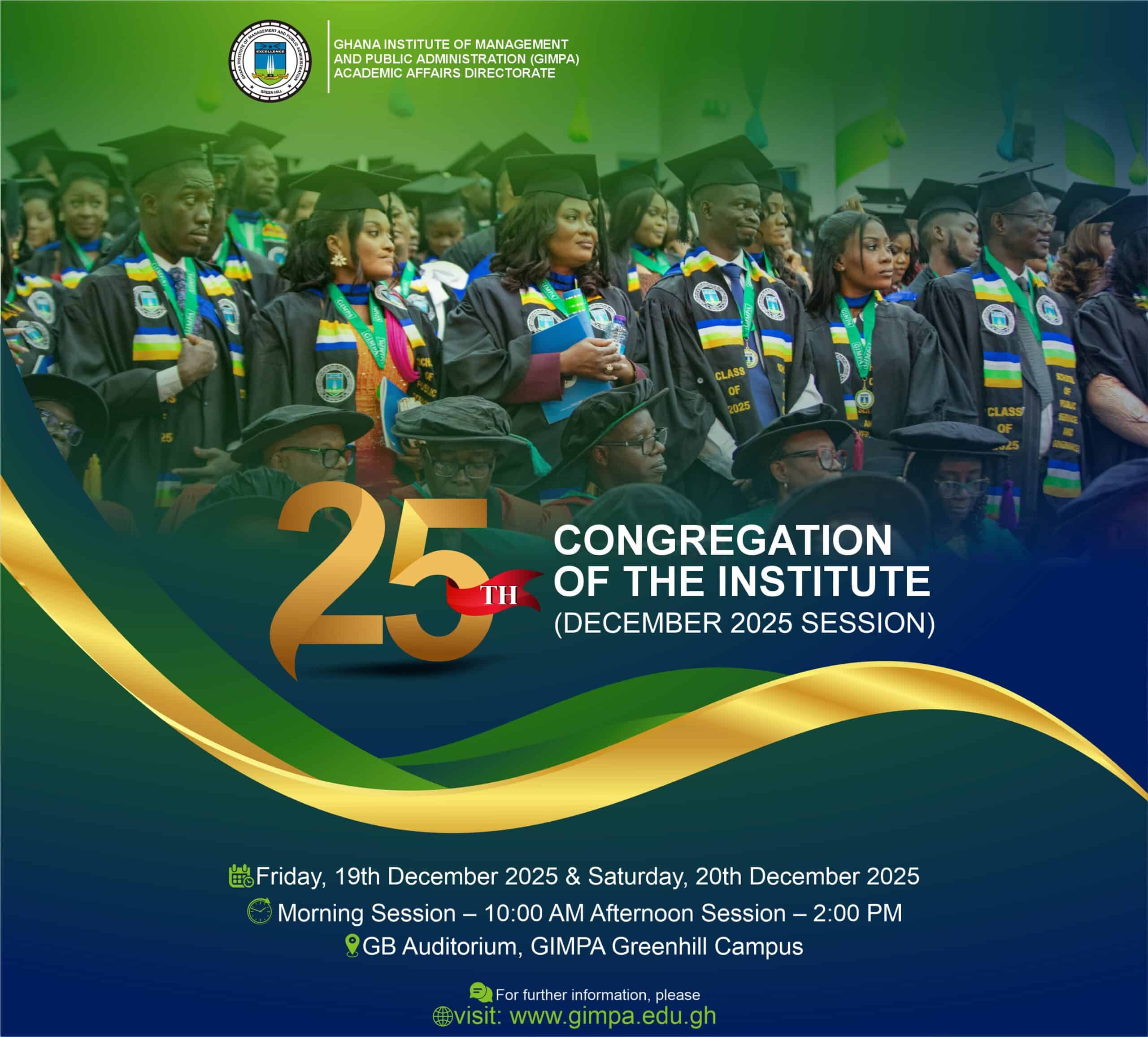School Of Technology
The School of Technology at our institution is committed to delivering a comprehensive and cutting-edge education in the field of technology. Our primary focus is to equip students with the skills and knowledge necessary to excel in today’s rapidly evolving technological landscape. We offer a wide range of programs and courses designed to provide a solid foundation in various technology disciplines.
School of Technology and Social Sciences
The School of Technology and Social Sciences at GIMPA, where innovation meets purpose and education transforms futures. We are dedicated to preparing the next generation of leaders who will drive technological advancement while addressing critical social challenges. Our comprehensive programs blend technical excellence with social insight, equipping students with the expertise needed to thrive in today’s dynamic digital economy. From foundational knowledge to specialized skills, we offer diverse programs across technology and social science disciplines that respond to industry demands and societal needs. Our commitment is clear: to develop professionals who don’t just adapt to change, but who lead it with competence, creativity, and conscience.
Discover your potential. Shape the future.
Dean’s Message
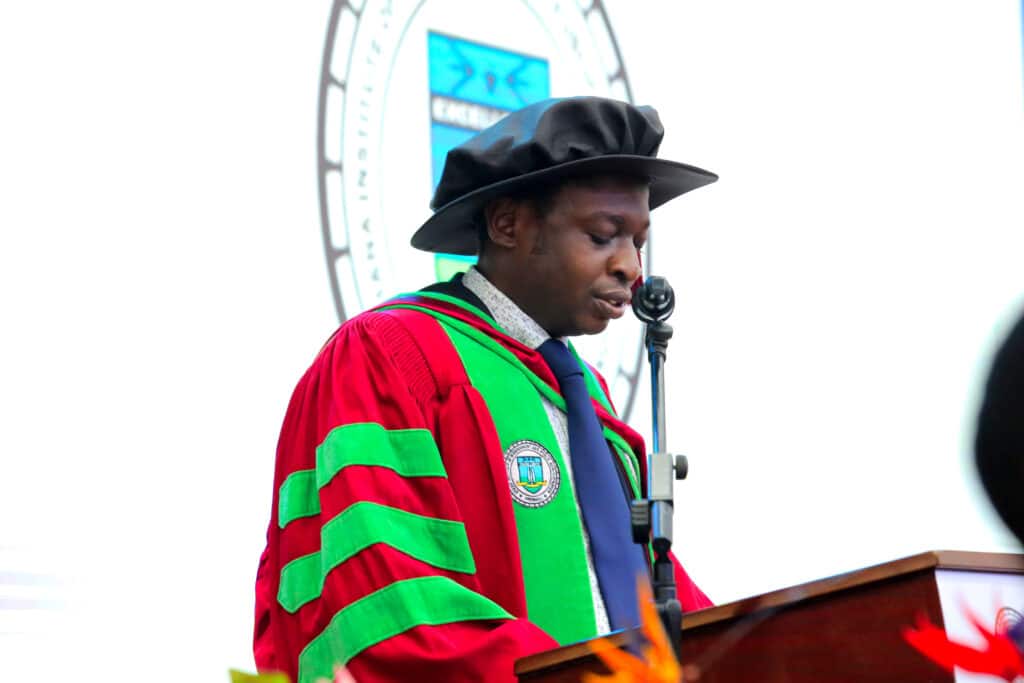
Prof Emmanuel S. Adabor
Dean, School of Technology and Social Sciences
It is my distinct pleasure to welcome you to the School of Technology and Social Sciences (SOTSS) at the Ghana Institute of Management and Public Administration.
At SOTSS, we stand at the dynamic intersection of technological innovation and social understanding. In an era where digital transformation is reshaping every aspect of society, our school is uniquely positioned to prepare leaders who can navigate complexity with both technical expertise and profound social insight. We believe that true progress emerges not from technology alone, nor from social theory in isolation, but from the thoughtful integration of both.
Our faculty members are dedicated scholars and practitioners who bring real-world experience into the classroom, fostering an environment where critical thinking, innovation, and practical application converge. Through rigorous academic programs, cutting-edge research, and industry partnerships, we equip our students with the knowledge, skills, and ethical foundation needed to address the multifaceted challenges of our time.
Whether you are pursuing undergraduate or postgraduate studies, engaging in research, or exploring partnerships with our institution, you will find SOTSS to be a vibrant intellectual community committed to excellence, integrity, and making a positive impact. We take pride in developing professionals who not only excel in their careers but also contribute meaningfully to national development and global progress.
I encourage you to explore our programs, connect with our community, and discover the opportunities that await you here. Together, we are shaping the future of technology and society in Ghana and beyond.
Welcome to SOTSS—Shaping Technology, Impacting Society.
Departments of School of Technology and Social Sciences (SOTSS)

School of Technology and Social Sciences (SOTSS)
Academic Programmes
Undergraduate Programmes
Department of Computing and Information Systems
BSc. Computer Science
This is a four-year programme, which aims to equip graduates with strong and broad technical skills and knowledge to take on appropriate positions pertaining to Computer Science and to some extent Information Technology and other related technology-oriented positions upon graduation and grow into leadership positions or to pursue research or graduate studies in the field. In the course of the program, students who are not already employed in Computer Science or Technology-related areas would undergo industrial attachments along with organized field trips. In the course of the progamme, students who are not already employed in Technology related areas would undergo industrial attachments along with organized field trips.
Programme highlights: Computer Programming, Data Structures and Algorithms, Data Communication and Networking, Software Engineering, Artificial Intelligence, Robotics, among others. Programme coordinator: N/A ADMISSION REQUIREMENTS:Applicants must meet any of the following minimum requirements: 1. Senior Secondary School Certificate Examinations (SSSCE), West African Senior School Certificate Examination (WASSCE) and General Business Certificate Examination (GBCE) The general requirements for admission of WASSCE, SSSCE and GBCE candidates to first degree programmes are three (3) credit passes in three core subjects and three (3) credit passes in three relevant elective subjects.
1. SSSCE Candidates: Credit Passes (A-D) in six (6) subjects comprising three core subjects, including English Language and Mathematics, and any three (3) elective subjects. 2. WASSCE Candidates: Credit Passes (A1-C6) in six (6) subjects comprising three core subjects, including English Language and Mathematics, and any three (3) elective subjects. 3. GBCE Candidates: Credit Passes (A-D) in six (6) subjects comprising three core subjects including English Language and Mathematics and any three (3) elective subjects. 2. General Certificate of Education (GCE) Advanced Level Candidates Passes in three (3) subjects (at least, one of the passes should be Grade D or better). Also, the applicant must have had credit passes (Grade 6) in five GCE Ordinary Level subjects including English Language, Mathematics and a Science subject (for non-science students) and an Arts subject (for Science students). 3. HND holders in Computer Science/Engineering, Electrical/Electronic Engineering, Information Technology (i.e. at least 2nd Class Lower Division) may be admitted to Level 200 or 300. Those who are awarded with 2nd Class Upper and 1st Class Divisions may be admitted to Level 300. Those who are awarded with 2nd Class Lower Division will be admitted to Level 200. HND holders in areas other than Computer Science/Engineering (irrespective of their classes) would not be admitted beyond Level 200 Other Diploma qualifications from elsewhere assessed to be equivalent to HND may be similarly considered. 4. Advanced Business Certificate Examination (ABCE) Candidates Full Diploma Certificate in ABCE. Also, the applicant must have had credit passes in five (5) subjects including English Language, Mathematics, Integrated Science or Social Studies in the General Business Certificate Examination (GBCE) or Senior Secondary School Certificate Examination (SSSCE) or West African Senior Secondary School Certificate Examinations (WASSCE). ABCE candidates who took the Information Technology option may be considered for admission to level 200 of a degree programme. 5. Mature Students must be at least 25 years at the time of applying and must write a qualifying exam and score an average of 50% in it. They must also have relevant working experience plus credit passes in Mathematics and English. 6. Certificate in Information and Communication Technology from GIMPA with an average score of not less than 55%. They must equally satisfy the requirements above for entering a tertiary institution. 7. Diplomas/Certificates from local and foreign institutions authenticated by the National Accreditation Board (NAB). For applications to pursue BSc Computer Science, a credit pass in Elective Mathematics will be required. All other certificates and any other qualification beyond the ones specified above would be referred to the GTEC for the establishment of their equivalences, to determine their eligibility for admission to the university.BSc. Information and Communication Technology
This is a four-year programme primarily informed by Information and Communication Technology (ICT) knowledge generation and the application of such knowledge in developing competency skills. It takes scientific approach to the study of ICT; and is therefore guided principally by the understanding and application of theory. Thus, students will be well-prepared to pursue Masters degrees, and also to take a scientific approach to new ICT development and management in the industrial world.
Programme highlights: IT Entrepreneurship & Leadership, Wireless Networks, Information Technology Auditing, Human Computer Interaction, Mobile Programming, Data Communication and Networking, among others. Programme coordinator: N/A ADMISSION REQUIREMENTS:Applicants must meet any of the following minimum requirements: 1. Senior Secondary School Certificate Examinations (SSSCE), West African Senior School Certificate Examination (WASSCE) and General Business Certificate Examination (GBCE) The general requirements for admission of WASSCE, SSSCE and GBCE candidates to first degree programmes are three (3) credit passes in three core subjects and three (3) credit passes in three relevant elective subjects.
1. SSSCE Candidates: Credit Passes (A-D) in six (6) subjects comprising three core subjects, including English Language and Mathematics, and any three (3) elective subjects. 2. WASSCE Candidates: Credit Passes (A1-C6) in six (6) subjects comprising three core subjects, including English Language and Mathematics, and any three (3) elective subjects. 3. GBCE Candidates: Credit Passes (A-D) in six (6) subjects comprising three core subjects including English Language and Mathematics and any three (3) elective subjects. 2. General Certificate of Education (GCE) Advanced Level Candidates Passes in three (3) subjects (at least, one of the passes should be Grade D or better). Also, the applicant must have had credit passes (Grade 6) in five GCE Ordinary Level subjects including English Language, Mathematics and a Science subject (for non-science students) and an Arts subject (for Science students). 3. HND holders in Computer Science/Engineering, Electrical/Electronic Engineering, Information Technology (i.e. at least 2nd Class Lower Division) may be admitted to Level 200 or 300. Those who are awarded with 2nd Class Upper and 1st Class Divisions may be admitted to Level 300. Those who are awarded with 2nd Class Lower Division will be admitted to Level 200. HND holders in areas other than Computer Science/Engineering (irrespective of their classes) would not be admitted beyond Level 200 Other Diploma qualifications from elsewhere assessed to be equivalent to HND may be similarly considered. 4. Advanced Business Certificate Examination (ABCE) Candidates Full Diploma Certificate in ABCE. Also, the applicant must have had credit passes in five (5) subjects including English Language, Mathematics, Integrated Science or Social Studies in the General Business Certificate Examination (GBCE) or Senior Secondary School Certificate Examination (SSSCE) or West African Senior Secondary School Certificate Examinations (WASSCE). ABCE candidates who took the Information Technology option may be considered for admission to level 200 of a degree programme. 5. Mature Students must be at least 25 years at the time of applying and must write a qualifying exam and score an average of 50% in it. They must also have relevant working experience plus credit passes in Mathematics and English. 6. Certificate in Information and Communication Technology from GIMPA with an average score of not less than 55%. They must equally satisfy the requirements above for entering a tertiary institution. 7. Diplomas/Certificates from local and foreign institutions authenticated by the National Accreditation Board (NAB). For applications to pursue BSc Computer Science, a credit pass in Elective Mathematics will be required. All other certificates and any other qualification beyond the ones specified above would be referred to the GTEC for the establishment of their equivalences, to determine their eligibility for admission to the university.BSc. Health Informatics
Diploma Programmes
Diploma in Applied Computer Science
Department of Liberal Arts and Hospitality Studies
BSc in Tourism and Hospitality Management
Admission Requirements
Undergraduate Programmes
Applicants must meet any of the following minimum requirements:
- Senior Secondary School Certificate Examinations (SSSCE), West African Senior School Certificate Examination (WASSCE) and General Business Certificate Examination (GBCE)
- The general requirements for admission of WASSCE, SSSCE and GBCE candidates to first degree programmes are three (3) credit passes in three core subjects and three (3) credit passes in three relevant elective subjects.
- SSSCE Candidates: Credit Passes (A-D) in six (6) subjects comprising three core subjects, including English Language and Mathematics, and any three (3) elective subjects.
- WASSCE Candidates: Credit Passes (A1-C6) in six (6) subjects comprising three core subjects, including English Language and Mathematics, and any three (3) elective subjects.
- GBCE Candidates: Credit Passes (A-D) in six (6) subjects comprising three core subjects including English Language and Mathematics and any three (3) elective subjects.
- General Certificate of Education (GCE) Advanced Level Candidates
Passes in three (3) subjects (at least, one of the passes should be Grade D or better). Also, the applicant must have had credit passes (Grade 6) in five GCE Ordinary Level subjects including English Language, Mathematics and a Science subject (for non-science students) and an Arts subject (for science students).
HND holders in Computer Science/Engineering, Electrical/Electronic Engineering, Information Technology (i.e. at least 2nd Class Lower Division) may be admitted to Level 200 or 300. Those who are awarded with 2nd Class Upper and 1st Class Divisions may be admitted to Level 300. Those who are awarded with 2nd Class Lower Division will be admitted to Level 200. HND holders in areas other than Computer Science/Engineering (irrespective of their classes) would not be admitted beyond Level 200 Other Diploma qualifications from elsewhere assessed to be equivalent to HND may be similarly considered.
Advanced Business Certificate Examination (ABCE) Candidates:
Full Diploma Certificate in ABCE. Also, the applicant must have had credit passes in five (5) subjects including English Language, Mathematics, Integrated Science or Social Studies in the General Business Certificate Examination (GBCE) or Senior Secondary School Certificate Examination (SSSCE) or West African Senior Secondary School Certificate Examinations (WASSCE). ABCE candidates who took the Information Technology option may be considered for admission to level 200 of a degree programme.
Mature Students must be at least 25 years old at the time of applying and must write a qualifying exam and score an average of 50% in it. They must also have relevant working experience plus credit passes in Mathematics and English.
Certificate in Information and Communication Technology from GIMPA with an average score of not less than 55%. They must equally satisfy the requirements above for entering a tertiary institution.
Diplomas/Certificates from local and foreign institutions authenticated by the National Accreditation Board (NAB).
For applications to pursue BSc Computer Science, a credit pass in Elective Mathematics will be required.
All other certificates and any other qualification beyond the ones specified above would be referred to the GTEC for the establishment of their equivalences, to determine their eligibility for admission to the university.
Graduate Programmes
Department of Computer Science and Information Systems
PhD Information Systems
In today’s interconnected world, Information Systems (IS) play a pivotal role across all sectors - from individual enterprises to global economies. The influence of IS extends far beyond mere technology; it shapes strategic decision-making, enhances operational efficiency, and drives innovation. Our PhD program in Information Systems is designed for those who seek to deeply understand and advance this critical field. Information Systems research is at the forefront of tackling complex challenges in technology integration, cybersecurity, data analytics, and digital transformation. Our doctoral candidates engage in rigorous scientific inquiry, developing advanced analytical skills and theoretical insights that contribute to the evolution of IS practices and policies. Through interdisciplinary study and collaborative research, our PhD candidates gain the expertise needed to address pressing societal needs, drive business competitiveness, and foster sustainable development.
Programme Highlights: Philosophy of Science and Technology, Advanced Quantitative Research Methods, Advanced Qualitative Research Methods, Directed IS Research and Professional Development, PhD Seminar among others.
Duration: three (3) years
Offering mode: Full time
Admission requirements
- Applicants must have a master’s degree in Information Systems, Computer Science, ICT, Electrical/Computer Engineering, Mathematics and Statistics or related fields from an accredited university.
- Exceptionally good students who obtain first class in Management Information Systems, Computer Science or ICT may be considered for admission.
- Holders of master’s degrees from other fields with a cumulative GPA of 3.0 or higher may also be considered for admission.
- Applicants who satisfy the above requirements will be short-listed and interviewed by the School’s Graduate Admissions Committee to select the best for the programme.
Programme Coordinator: Professor Gamel Wiredu
E-mail: csshead@gimpa.edu.gh
Master of Science in Digital Forensics and Cybersecurity
The principal aim of this MSc Digital Forensics and Cyber Security programme is to impart knowledge on analysis, assessment and minimisation of cyber security risk and, effective ways to extract and use digital information from a wide range of computerised systems and devices. The programme also explores the central legal issues in generation, analysis and use of digital evidence and their implications on security, information privacy and data protection. Programme Highlights: Cybercrime and Risk Management, Digital Forensics, Information Technology Audit, Database and Programming, Legal Aspects of Information Technology, and Cryptography and Security Mechanisms. Duration: One (1) Year Offering mode: Weekends Programme Coordinator: Dr. Joseph Budu E-mail: josbudu@gimpa.edu.gh
Admission requirementsApplicants must have a minimum of Second Class Lower Bachelor’s degree in computing, information systems, or electronic engineering, or any other related discipline from an accredited University. Applicants with degrees from non-computing related fields must first take and pass the post-graduate diploma in Information Technology offered at the School of Technology, GIMPA. A complete application pack must include: • A completed GIMPA application form; • Official transcripts of the applicant’s previous academic record at the university level; • Full curriculum vitae • A statement of purpose; • Three letters of recommendation commenting on the applicant’s ability to pursue the programme
Master of Philosophy in Management Information Systems (MPhil)
The programme will touch on the main tenets of MIS – analysis, development, implementation and management – and their applications in business/public administration. MIS will be discussed in terms of its strategic value and challenges as they are adopted and deployed by both public and private sector organisations. Modules in the programme will delve into the particular dimensions of the tenets with the aim of evaluating alternative methodologies, and philosophies in each of them. It will also aim at discussing these methodologies and the suitability of their applications in the contexts of public and private sector organisations. The following modules will define the programme: Duration: Two (2) Years
Offering mode: regular (day) Programme Coordinator: Prof. Gamel Wiredu E-mail: gwiredu@gimpa.edu.gh Admission requirements: 1. Applicants who hold undergraduate degrees a) They must have a Bachelor’s degree from an accredited university. b) Those with a minimum of second class upper degree may be admitted directly after their Bachelor’s degree. c) Those with a grade below second class upper degree should have a minimum of two years work experience. d) They may come from a variety of backgrounds but must have a basic knowledge and skills in information technology. e) A formal interview may be used to determine all applicants’ ability to take and pass the most technical courses of the programme. 2. Graduates of GIMPA MSc in Management Information Systems: a) must obtain a FGPA of 3.0 or more b) will be exempted from all Year One courses 3. Graduates of GIMPA Post-Graduate Diploma in Management Information Systems who meet requirements a) and b) below will be admitted into the programme and exempted from taking the following courses: ● Organisational Study of Information Systems ● Information Risk and Security a) They must pass each of the following courses in the Diploma programme with a grade point average of 3.50 or better: ● Foundations of MIS ● Information Systems Security b) They must obtain a cumulative grade point average of 3.50 or better.MSc /MPhil Information and Communication Technology
Today, it is difficult to think of an individual, group, organization or nation that is not being affected by Information and Communication Technology (ICT). ICT is no longer a sidestream issue but a mainstream one that must be confronted and understood for socio-economic development, for business strategising, for personal organisation, and for enhanced group collaboration. The programme equips students with scientific knowledge for analytical thinking in ICT development and management.
Programme highlights: Information and Network Security, Decision Support Systems, Software Engineering, Wireless Network Architecture and Design, Data Communications and Networks, Artificial Intelligence Applications, among others.
Duration: two (2) years
Offering mode: weekends and Evening
Programme coordinator: N/A
Admission requirements
- Applicants must have a minimum of 2nd Class Lower Bachelor’s degree in ICT, Computer Science or ICT-related discipline from an accredited university.
- A formal interview shall be conducted for applicants with other backgrounds to determine the ability of all applicants to take and pass the most technical courses of the programme.
MSc Information Technology and Law
This MSc Information Technology and Law (IT & Law) programme is intended to equip students with critical understanding of the legal and administrative implications on adoption, implementation and use of ICT innovation, and information privacy, security and aspects of law that are most relevant to the work of IT-professionals.
Programme highlights: Legal Environment & Commercial Law, Digital Media and Intellectual Property Law, Computer Forensics and Cybercrime Investigation, Internet Governance and ICT Regulation, Electronic Transactions Law, Information Privacy and Data Protection, among others.
Duration: two (2) years
Offering mode: weekends and Evening
Admission requirements
- Applicants must have a minimum of 2nd Class Lower Bachelor’s degree in ICT, Computer Science or ICT-related discipline from an accredited university.
- A formal interview shall be conducted for applicants with other backgrounds to determine the ability of all applicants to take and pass the most technical courses of the programme.
MSc Industrial Analytics
Rapid advancements in technology are transforming every sector from biology and engineering to finance and manufacturing. These fields now generate massive volumes of data that can be analysed to understand complex phenomena and predict future system behaviours. Industrial analytics bridges this gap by combining advanced mathematical, statistical, and computational techniques with domain-specific knowledge to solve real-world industrial problems. The MSc in Industrial Analytics provides this critical interface. The programme equips students with strong analytical skills and hands-on tools to extract insights, optimize processes, and support evidence-based decision-making across diverse industries.
Programme highlights: Industrial Analytics, Management Science Stochastic Processes, Statistical Modelling, Statistical & Machine Learning, Database and Programming, Mathematics for Industry, Computer Solutions and Modelling, Financial Analytics, among others.
Duration: one (1) year
Offering mode: weekends and Evening
Admission requirements
- Applicants must have a minimum of Second Class Lower Bachelor’s degree in Mathematics, Statistics, Actuarial Science, Engineering, Computer Science, Physics, Finance, Economics or any other related discipline from an accredited University.
- A formal interview or aptitude test may be used to test suitability of applicants with bachelor’s degree from other fields
Postgraduate Programmes
PG. Dip.(MIS) Management Information System
PG.Dip.(ICT) Information and Communication Technology
Department of Economics and Applied Mathematics
Master of Science in Economic Policy
The Master of Science in Economic Policy is a one-year programme designed to develop knowledge and expertise in the areas of economic policy analysis and management. The programme is designed to:
- Train analytically skilled personnel in the area of economic policy-making for business, government, and society needed to fill roles within government, the public sector and various organisations;
- Equip students with the requisite knowledge and in-depth understanding of core economic and relevant management models for policy analysis and decision making within various organizations; and
- Prepare students for successful employment in government, not-for-profit institutions, international organizations, and the private sector in the area of economic policy analysis.
Master of Science in Energy Economics
The Master of Science in Energy Economics is a one-year programme open to first degree holders interested in developing expertise in energy resource analysis and management. The programme is designed to:
- Train analytically skilled personnel in the area of energy economics, energy policy and policy for business, government, and society. Such personnel are needed to fill policy-making roles within public and private energy sectors, and various international organizations.
- Equip students with an in-depth understanding of core economic and relevant management models for Energy resource management to enable them work as energy resource/policy analysts in the energy industry.
- Prepare students for successful employment in government, not-for-profit institutions, international organizations, and the private sector in the area of energy policy analysis and beyond.
Master of Science in Financial Economics
The Master of Science in Financial Economics is a one-year programme designed to develop knowledge and expertise in the area of Financial Economics. The programme is designed to:
- Train analytically skilled personnel in the area of financial economics to fill roles within government, private sector, and international organizations.
- Equip students with the requisite knowledge to support efforts at improving markets by improving the financial sector, developing new commodity markets and exchanges, and deploying other knowledge on market performance-improving mechanisms to promote the economy of Ghana.
- Prepare students for successful employment in government, not-for-profit institutions, international organizations, and the private sector in the area of finance, financial markets and beyond.
Department of Liberal Arts and Hospitality Studies
M.A. Development Communication
This is a unique programme designed to address development challenges and to close the poverty gap. Its strength is undergirded by the matrices of Indigenous Knowledge (IK) and Information Communication Technology (ICT). It is driven by nuanced diffused development communication strategies to galvanize multifaceted development at the community, national and international levels. The programme develops synergies for sustainable development approaches and knowledge transfer for secured livelihoods. It adopts new trajectories and places emphasis on critical analysis, case studies and application of development and communication strategies within contexts. The programme positions participants for careers in both local and international Governmental and Non-Governmental Organizations and for self-employment as entrepreneurs. Some of the key courses offered are: Stakeholder Engagement; Development Communication Strategies; Health Communication; NGOs Management and Development; and Documentary Production among others.
M.A. Public Relations
The Master of Arts in Public Relations is designed to address specific needs in the public relations industry. It has a cutting-edge design and execution strategies. The emphasis is on quality application of scientific research tools using ICT as the key driver to impact the PR industry, management and administration as a whole. We train graduates who are research-minded, critical thinkers, problem-solvers, and ready to meet greater challenges of the 21st century. As part of the social contract, we train and prepare graduates/professionals to become entrepreneurs and innovators and to take-up managerial roles in both the private and public sector. Some of the key courses at the heart of the programme are: Stakeholder Engagement; Corporate Communication; Protocol and Event Management; Public Speaking and Presentation Skills; and Documentary Production among others.
Admissions
With over 6,000 students enrolled in six schools for undergraduate and graduate studies, prospective student interest continues to rise.
Want to Study at GIMPA?
- Application can be done manually or electronically (online).
- The online application platform can be accessed by clicking Apply Now button.
- Application payment can be made at any Consolidated Bank Ghana (CBG) nationwide using your application generated upon completion of the online application (new application fees will be applied).
- International Students will pay $100.00 for the application fee with VISA card.
- Applicants must note that the admission process to GIMPA is very transparent. Applicants should therefore beware of any persons who may approach them on the pretext of assisting them gain admission at a fee.
Frequently Asked Questions
Where can I get application forms?
Admission fee is payable ONLY after you submit your application.
Obtain your application code (eg. APPL0000) from your dashboard by clicking on Application Summary (on the top right corner).
Applicants who wish to pay with a VISA Card are to use the Ecobank Payment Method
CBG USSD (Mobile Money) Payment Mode
- Dial *924*200*16# from your mobile phone;
- Select Application Form;
- Enter Unique Code (Application Code - eg. APPL0000);
- Select Yes;
- Select Mobile Money or Bank Account and follow through to make payment.
Alternative, walk into any CBG branch and pay with your Application Code (eg. APPL0000).
Ecobank (Mobile Money/VISA) Payment Mode
- After you submit your application, a dialogue box will pop up; select Ecobank using the drop-down menu of the 'Payment Method' field and follow through the prompts to complete your payment;
- Alternatively, on your dashboard, click on the 'Pay Application' button, select Ecobank using the drop-down menu of the 'Payment Method' field and follow through the prompts to complete your payment.
Payment of the application fee enables your application to be processed.
Please contact the admissions office via admissions@gimpa.edu.gh should you need any assistance with the online application process.
How much is the application fee?
- Application fees are as follows:
Masters/Postgraduate Diploma: GHc250 - Bachelors (including WASSCE LL.B)/Diploma: GHc200
- International Students: US$100
What number can I call for enquiries?
The main numbers for the school are +233-(0) 501620138, +233-(0) 332095432, +233-(0) 302908076, +233-302-401681-3</br>
Email: sot@gimpa.edu.gh
Email: admissions@gimpa.edu.gh
Mobile/WhatsApp: 050 140 8298, 050 466 9564, 024 422 9931, 024 626 4300
What is the duration of your degree programmes?
- Undergraduate programmes are usually 4 years.
- Masters programmes are for 1 or 2 years, depending on the programme.
- Post Graduate Diploma programmes are usually a year.
- However, you are encouraged to confirm with your prospective secretariat as some programmes may have a unique timeline.
NEWS STAND
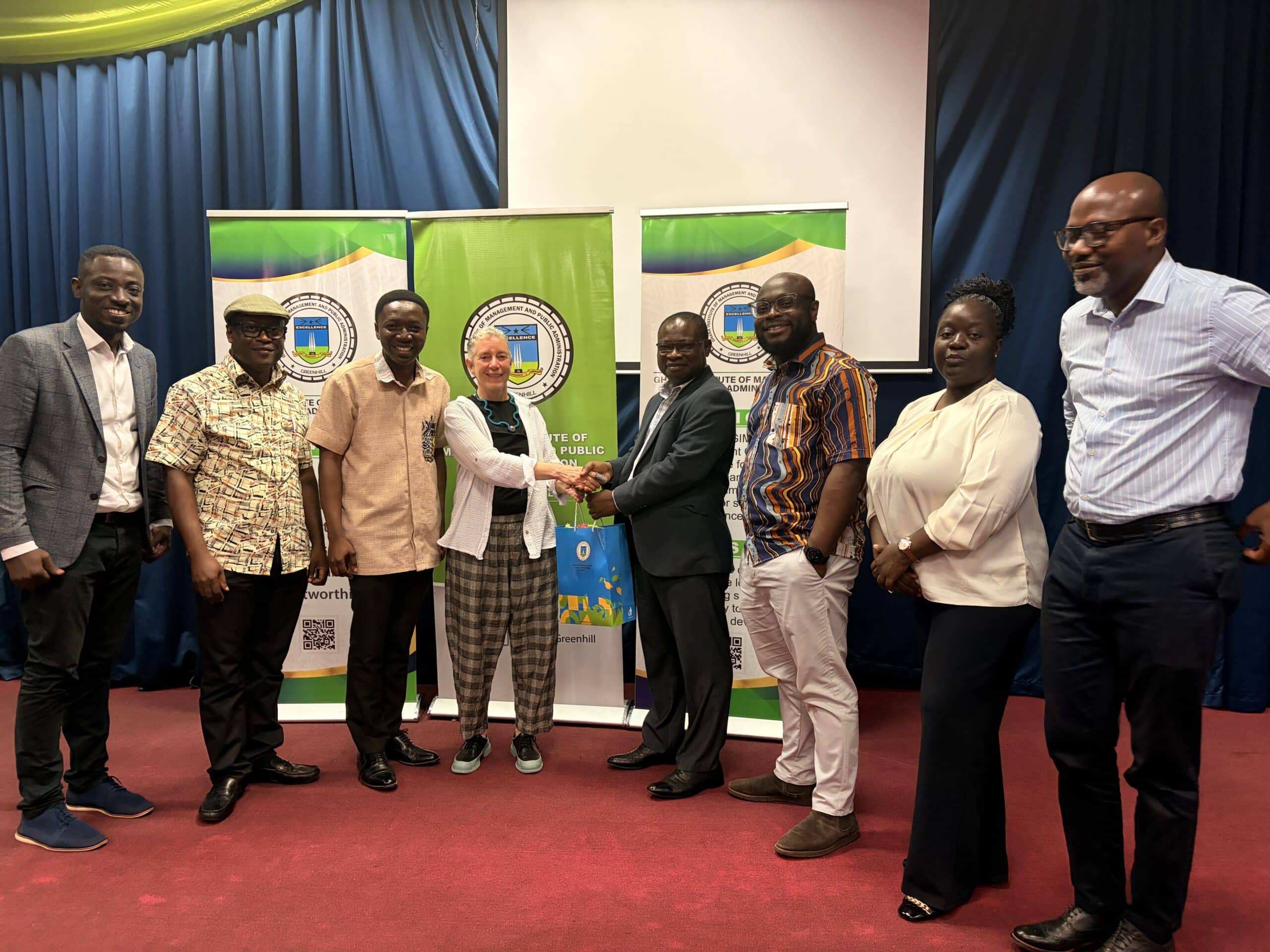
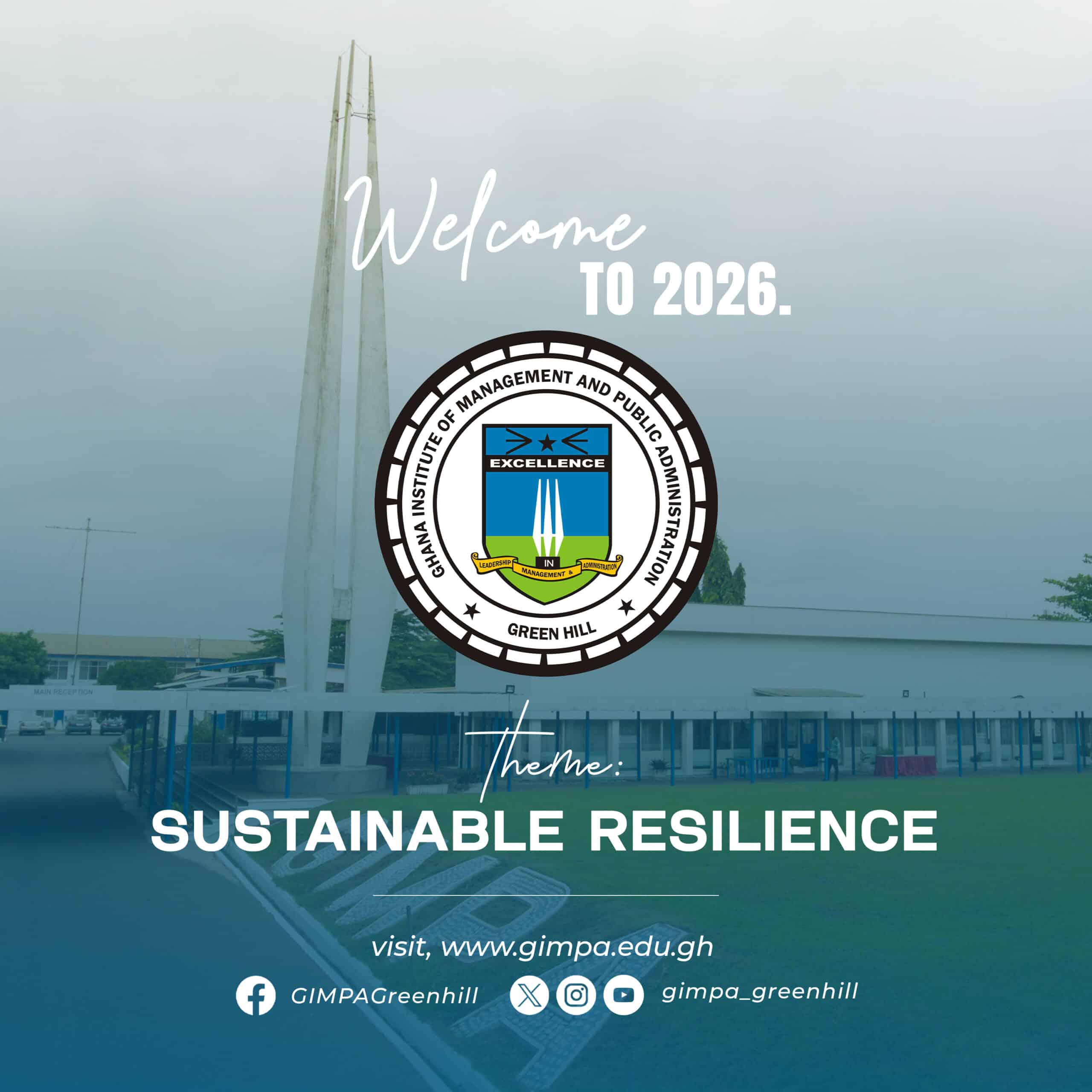
New Year Message from Prof. Samuel K. Bonsu, Rector of GIMPA
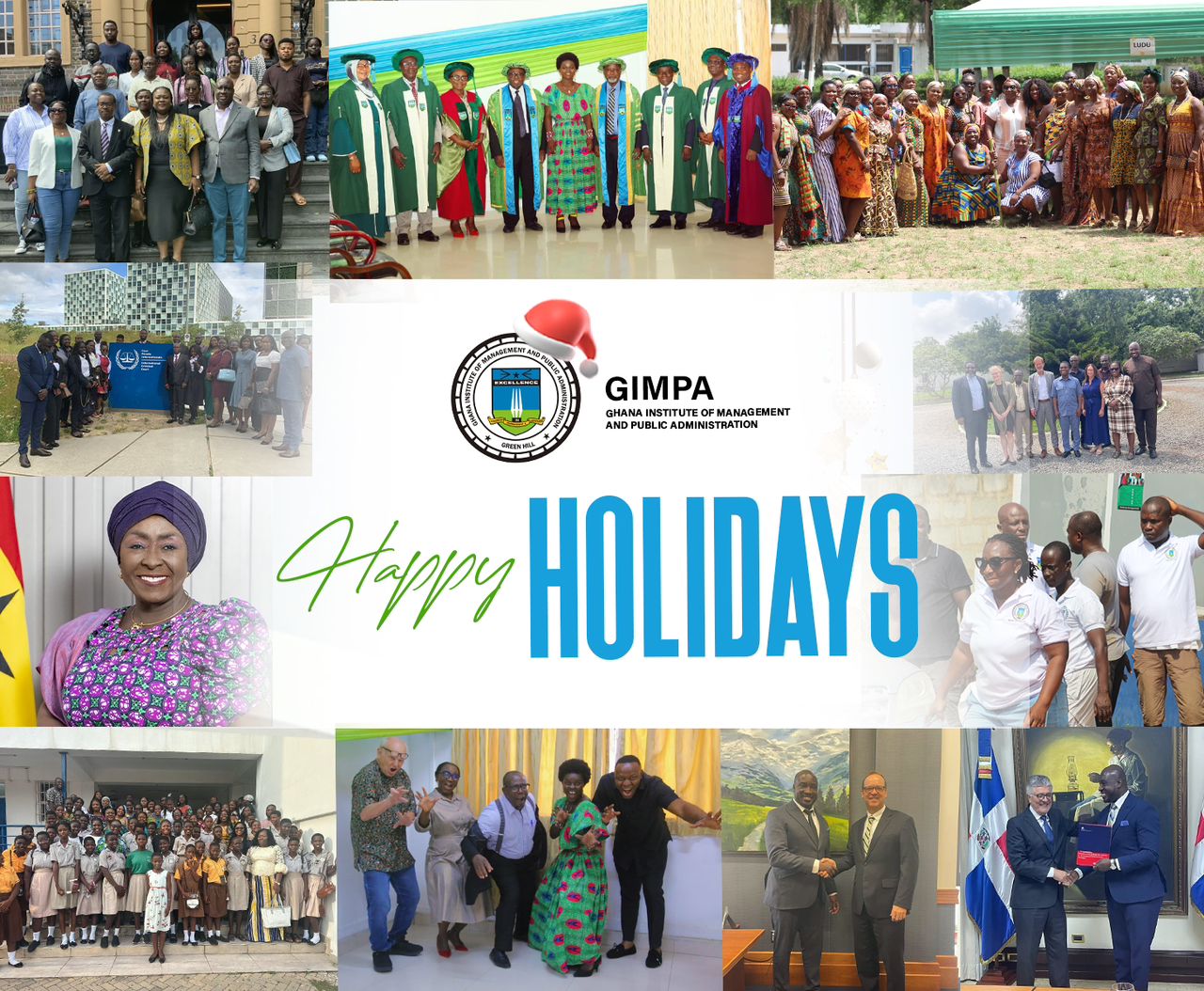
Christmas Message from Prof Samuel K. Bonsu, Rector of GIMPA
